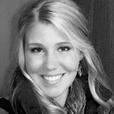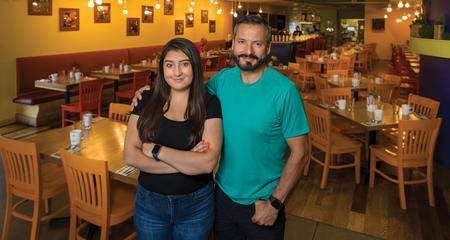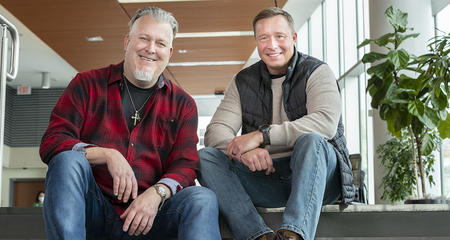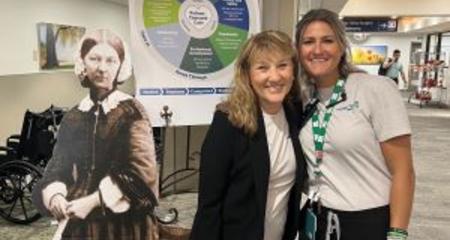Early on in my induction phase of chemotherapy, my mom found an organization which focused on young adults with cancer. I stared doe-eyed at her and shook my head, no. I was not ready to let strangers know I had cancer. It was hard enough to tell my loved ones. I did not want to hear their stories and have their imagery haunting me. I needed to paint my own picture based on the knowledge handed down from my doctors and the literature my nurses provided. I rapidly learned about each of the different chemotherapies that were going to be coursing through my veins. I needed to learn the doctor's language so I could communicate with them efficiently. I couldn't grasp why I got cancer, but I could understand the science behind treatment.
However concrete science may be, being diagnosed with cancer at the age of 25 yields little to no statistics relevant for my age. I had no concrete evidence to back me up. The statistics on 50+ year-old adults were frightening. I refused to believe I was going to be put into that category. I developed a mantra to repeat whenever I felt afraid of what was coming next: "I am not a statistic. I will beat the odds." After all, someone has to be part of the good outcomes, and I was going to be that person.
As I became settled in my chemotherapy regime and started to learn about transplantation, I became brave and wanted to reach out to others. I was quickly engulfed in how wonderful social media can be to connect to complete strangers who also have cancer. I joined several online supports groups and browsed different cancer sites regularly. I asked my mom to tell me more about the young adult cancer group. "It's called 'Stupid Cancer,'" she said. I laughed at how appropriate the name was and could definitely understand this was meant for young adults.
Their website was helpful and easy to use. The most exciting thing about Stupid Cancer was that they held a conference for young adults affected by cancer. I was thrilled to take my level of support from online to in person. However, I could not attend the upcoming conference because I was only two months' post-transplant.
During this time, I became connected with three other women around my age with the same cancer diagnosis and transplantation. We spanned the country — Washington, Wisconsin, Florida and Massachusetts. We quickly became survivor sisters and talked multiple times a day. Shortly after I celebrated my first year post-transplant, my survivor sisters and I planned a trip to meet each other in person. We chose to meet in Breckenridge, Colo., because of the somewhat central location and the majestic beauty of the mountains.
We giddily planned our event and even dreamed that maybe our story would get to "The Ellen Show." I decided to reach out to Stupid Cancer because it appeared from their website they had a strong presence in Denver. Matthew Zachary, the founder and CEO of Stupid Cancer who is a 20-year brain tumor survivor, responded to my e-mail and put me in touch with a couple of volunteers in Denver. He then asked if I would be interested in telling my story publicly on the Stupid Cancer radio show. I was overcome with emotions, reflecting back on how scared I was to reach out and now I had the chance to share my story in a very public way. I recalled how moving and impactful hearing the stories of survivors while participating with the Leukemia and Lymphoma Society's Team In Training before I was diagnosed. I knew at that moment of reflection, I needed to share my story.
I was tremendously nervous for my very organic 15 minutes on air. The show went off without a hitch, and I thanked them for allowing me the time to tell my story. Sean Shapiro, director of development for Stupid Cancer, contacted me after the show and asked if I would be willing to volunteer for them. After a couple phone calls and e-mails, I accepted a volunteer position and started to fundraise for Stupid Cancer. I felt empowered for the first time since being diagnosed.
Stupid Cancer has a V.I.P. Program, which is a fundraising platform for their conference, CancerCon 2015. For every $2,000 raised, I would be awarded a $600 travel voucher to be used on the conference fee, hotel and airfare. I set my goal for $4,000 so my husband and I could attend the conference together. I quickly surpassed my goal of $4,000 and asked if I could use additional funds raised to help other survivors come to CancerCon. They agreed, and I had my mission. I wanted to raise as much as possible so I could sponsor more survivors. In the end, I raised $10,551. I sponsored three other individuals and claimed the number one spot for most funds raised in Stupid Cancer history. I am fundraising again this year and hope to surpass last year's amount.
CancerCon 2015 was a turning point in my recovery. I had recently celebrated my two years' post-transplant and felt like something was still missing. CancerCon fed my soul and helped me accept the past and start to move on and get busy living. I volunteered to help hand out swag bags, which was a great way to meet a lot of people. On the first night the energy was palpable in the air as the conference-goers mingled, sang karaoke and bonded. The next morning, I participated in a fun 5K run/walk put on by the Ulman Cancer Fund. My first session, I learned about long-term care follow-up for blood cancers and heard from multiple doctors around the nation. I attended a first-time conference-goers' session and met a lot of people through engaging ice breakers.
Walking into the vendor room stopped me in my tracks. It took my breath away to see row after row of exhibitors specifically showcasing products designed to help young adults affected by cancer. The amount of support available at my fingertips dumbfounded me. It is not easy to search online for specific groups for young adults with cancer. Even though we are unfortunately a growing population, the organizations are small and can't compete with large, well-advertised organizations not specific for young adults. I could have easily spent all day talking with each vendor. Conquer magazine was an exhibitor and graciously asked if Scott and I were comfortable sharing our story for print. We both said yes and shared our emotional journey with them as a young newly married couple going through cancer. The article is due out later this month.
I found numerous adventure-focused groups. Their aim is to challenge your body physically while healing emotionally with other survivors on some epic hikes, rock climbing, camping, whitewater kayaking, ice hiking or surfing. As an outdoor enthusiast, I really connected with these vendors. I signed up to attend a weeklong outdoor young adult camp in Missoula, Mont., called Camp Mak-A-Dream. I was able to give thanks and many hugs to an organization, Hope for Young Adults with Cancer, that awarded me a grant to help with medical costs. Being able to meet the hardworking volunteers face-to-face who made my life easier brought tears to my eyes and theirs. The Glam Squad made me feel like a princess and made me feel beautiful again. Stupid Cancer brought all of these wonderful organizations together for a collaborative effort in supporting young adults.
The breakout sessions, keynote speakers and downtime brought me together with others I could connect with over real issues we uniquely face as young adults. A fertility session gave me hope that one day I could grow my family. Even though it won't happen in a natural way for me, that does not undermine my authority and right to be a mother. Most people have to take out loans to buy a house, car or boat and don't think twice about the debt they will be in because of their purchase. This sentiment was an epiphany; it made me realize putting myself in debt to have a child is by far the best kind of debt I could ever get into.
The keynote speakers make you laugh and in the same breath can bring you to tears. Their talks are inspirational, motivational and make you want to start taking steps in the direction of not letting cancer solely define who you are. Connecting with other young adults throughout the weekend was by far the best thing. It was like coming into contact with an old friend and picking up right where you left off. We could instantly bond, speak a similar language and feel like we weren't alone anymore. Simply being in the presence of 600+ young adults affected by cancer made it feel like home. We didn't have to sugarcoat anything. We could share graphic stories and know the other person would understand. We let our hair down, laughed, cried, hugged, cried and laughed some more. We were healing each other emotionally by simply just being there together and being able to say, "Me too!"
The very next day I had a doctor's appointment with Dr. Ehab Atallah. I was sad to not be in the midst of my newfound family, but I was also bursting to tell my Froedtert care team about my weekend. I couldn't contain my tears as I told him I finally didn't feel alone anymore. I found a community of people who work together to support the needs of young adults. I am beyond excited and proud Froedtert will be having an Adolescent and Young Adult Clinic. We are an underserved population, and it warms my heart to know the hospital where I received topnotch care also feels passionately about supporting all of its populations.
Stupid Cancer has given me purpose again by providing me tools to create a meaningful survivorship. To read more about this organization, visit: stupidcancer.org.
Share Your Thoughts
Was it a challenge to find support that related to your situation? What resources did you find? Share your comments below.




Hi Vanessa, I'm so glad that you found Stupid Cancer, and that it helped you to connect with other young adults. I am also happy to hear that Froedtert is going to be reaching out to younger cancer survivors.
I have been a caregiver to my husband when he was diagnosed with AML, Acute Myeloid Leukemia in 2012. He is in his 50's, but I agree with you that Froedtert gives top-notch care. We are so thankful for the support that we received from all the staff at Froedtert.
Kim Yoghourtjian
Thank you Kimberly! I hope you husband is doing well. Happy New Year!